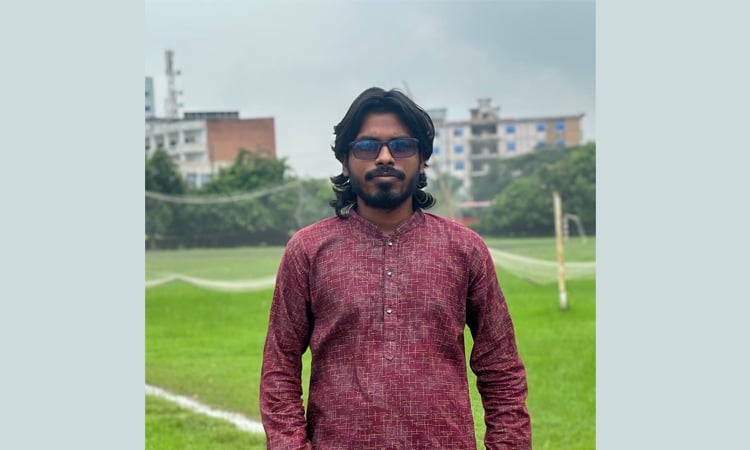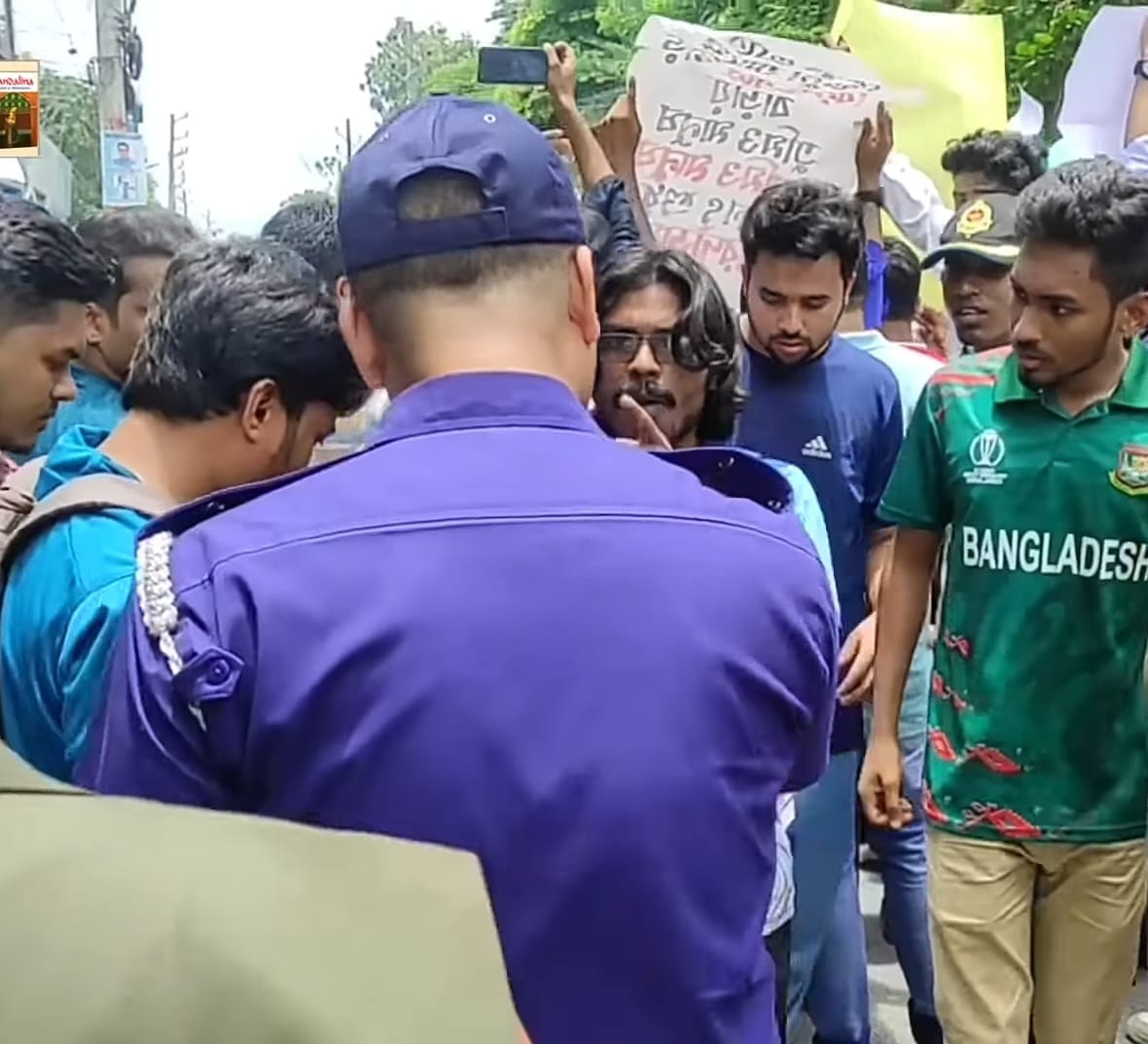News Flash
News Flash

By Poliar Wahid
DHAKA, July 26, 2025 (BSS) - "After Abu Sayeed and Wasim Akram became martyred, our only goal was to oust fascist Sheikh Hasina," says Samiul Azim Shishan, one of the frontline leaders of the 2024 July mass uprising-a movement that etched one of the bloodiest chapters in Bangladesh's political history.
Born on April 6, 2003, in Chunati Union of Lohagara upazila, Chattogram, Samiul is a student of Industrial and Production Engineering at Jessore University of Science and Technology (JUST). During the uprising, he emerged as a key coordinator from JUST and is currently serving as a central organizer of the Bangladesh Gothontantrik Movement.
Samiul's political journey began in 2018 during the quota reform and safe roads movements. Since then, the streets have become a second home to him. He has remained at the forefront of all progressive, pro-people movements in the country and served as a member of the Student Union and joint convener of its Jessore Municipal unit.
Over the years, Samiul has been subjected to repeated repression by then ruling Awami League and its student wing, Bangladesh Chhatra League. On July 15, 2024, during the Anti-Discrimination Student Movement, he was brutally tortured inside a dormitory torture cell run by Chhatra League leaders and activists.
In an exclusive interview with BSS, Samiul recalled those unforgettable memories and first-hand experience on the streets.
BSS: As we approach the first anniversary of the July Uprising, how deeply do you still feel those moments?
Samiul Azim: I feel them profoundly. Honestly, some nights I still shudder at the thought of what we endured last year. Thousands of people died. I feel sick watching the footage. I myself was attacked. It feels like I'm living the life of a dead man. I could have become a martyr too.
BSS: What role did JUST students play in the quota reform movement?
Samiul Azim: From the beginning, JUST students played a leading role. The entire movement in the southwest region started with us. On the day of the 'Bangla Blockade', we led a massive rally. Police attacked us, but because the media didn't cover it, few people heard about what happened in Jessore.

BSS: Can you share a memory from the uprising that you haven't talked about before?
Samiul Azim: There are many such memories. Let me mention a few. Because I was a coordinator, Chhatra League beat me and threw me out of the dorm. I took shelter in a senior's house in the city and continued organizing from there. But the neighbor got scared by my activism and started threatening me. Eventually, even the person who had given me shelter kicked me out-especially after I was taken by law enforcers.
BSS: When did law enforcers detain you, and what happened there?
Samiul Azim: On July 28, people across the country began withdrawing from the movement. That's when we came under heavy pressure. Law enforcers called our coordinator Rashed Khan and summoned him. When he initially refused, they threatened to abduct all of us. We decided not to stop the movement, but that only a few of us would meet them.
They gave us a location-looked abandoned from the outside but it was in the heart of the city. At first, they treated us nicely and asked us to withdraw the movement. When we refused, they offered a large sum of money. We rejected that too, so they began threatening us in various ways.
Luckily, our fellow activists had gathered nearby, and the law enforcers noticed that. Eventually, they let us go. After that day, we were the ones who continued the movement.
BSS: When were you actively involved in the uprising?
Samiul Azim: I was active from July 5 and stayed on the ground until Hasina stepped down. Ironically, some of the people who wouldn't even respond to our calls back then now act like big leaders. It's laughable-and sad.
BSS: Before the one-point demand was declared, did you believe Hasina would flee?
Samiul Azim: Yes. That was the only hope that brought me into the movement. People were fed up with her tyranny. The day we brought out protests march against Hasina's derogatory remark calling students 'the grandchildren of razakars', I felt it might happen. But when Wasim bhai and Abu Sayeed bhai were martyred, I knew for sure-we wouldn't let her stay. Every day I felt-this might be my last. I might not return home tomorrow.
BSS: Where were you on August 5, and how did you come to know that Sheikh Hasina fled? What did you feel that moment?
Samiul Azim: I was protesting at Chachra Mor in Jessore. Around 2pm, I heard the news from my comrade Jaber. I was trying to calm the excited crowd. Honestly, I have no words to describe what I felt. Can you easily describe the feeling of winning a revolution after so much sacrifice?
BSS: How would you describe the role of university faculty during the movement?
Samiul Azim: Their role was remarkable. We saw both types-sycophants and genuine teachers. The honorable ones stood by us. One teacher I must mention is Avinu Kibria Islam. On July 18, when we entered the university, another teacher was provoking the police to shoot us. But Avinu sir tried to calm us, and when he couldn't stop us, he was nearly in tears. He ultimately helped save us. I still remember the poem recited by Jahangirnagar University's Rabbani sir-it moved me deeply.
BSS: Did you face resistance from your family for joining the movement? What did your parents say?
Samiul Azim: I'm one of the lucky ones. My parents never stopped me. Even though I'm their only son, my mother once said, "I gave birth to you for the country. If needed, give your life for it." My father is a freedom fighter-he told me to dedicate myself fully.
BSS: How did Chhatra League's attacks affect general students?
Samiul Azim: For a long time, students resented Chhatra League's misdeeds. They were Hasina's tool to suppress freedom of speech. When Chhatra League attacked us, that rage exploded. Students joined us like a swarm of bees.
BSS: What impact did female students have on the movement?
Samiul Azim: They elevated the movement to a whole new level. They set an example of gender equality-at times, their role surpassed that of the men. In Jessore, for instance, when police tried to attack us, it was the women who formed a human shield. Sadly, we failed to properly recognize their contributions later.
BSS: How do you view the role of police and administration during the crackdown?
Samiul Azim: There's nothing new to say. Police acted like Hasina's armed goons. They committed heinous violence and faced no consequences. I believe the entire force should've been disbanded and reformed. They're morally bankrupt and utterly corrupt-you can't expect justice from them. Even after the uprising, they didn't reform. The same police who fired on students were later seen attacking private university students again! Can you believe it? Videos exist of those who fired. Why haven't they been arrested? Why no proper charges?
I'm not in favor of harassing the innocent-but those who directly opened fire must be tried. Otherwise, what justice are we talking about? Even the top culprits like the Home Minister and DB Harun escaped. How? Why are we focused on symbolic reforms while ignoring the core? Police, health, and education-all three sectors are still neglected. Is this what our brothers died for?
And what about those responsible for abductions, secret torture cells? Will there be no justice for those crimes? Can you guarantee that I won't be disappeared in the future? The same people are still in service-unchanged, unpunished.
BSS: What kind of threats did you face during the movement?
Samiul Azim: I was probably the first one in Bangladesh to be tortured inside a room by Chhatra League for participating in the movement-this happened on July 15. Beyond that, I received numerous death threats. Even now, I live under constant threat. At the law eforcement office, they also threatened me to withdraw from the movement.
BSS: What steps did you take for the injured and martyred protesters?
Samiul Azim: We contacted various institutions, urged hospitals in Jessore to treat the injured for free. We appealed to the District Commissioner and others. But sadly, the July Foundation failed miserably. Proper treatment wasn't ensured. Even the list of martyrs is incomplete. The government didn't even trace those buried without names. If a government born of our blood forgets our martyrs-who can we trust?
BSS: How much of the uprising's dream has been fulfilled?
Samiul Azim: Nothing has been fulfilled. The frontline fighters were betrayed first. No justice for the injured or martyrs. No revolutionary government was formed.
BSS: What is your vision for a post-autocratic Bangladesh?
Samiul Azim: A Bangladesh free from discrimination-where all classes of people are treated with dignity. This land has seen many uprisings, but never a true revolution-because of power lust. We must turn this uprising into a revolution. That means a total systemic change. I believe this uprising has sparked a revolution in people's minds. We may have to shed blood again, but we must complete the revolution. Otherwise, how will we face the people?